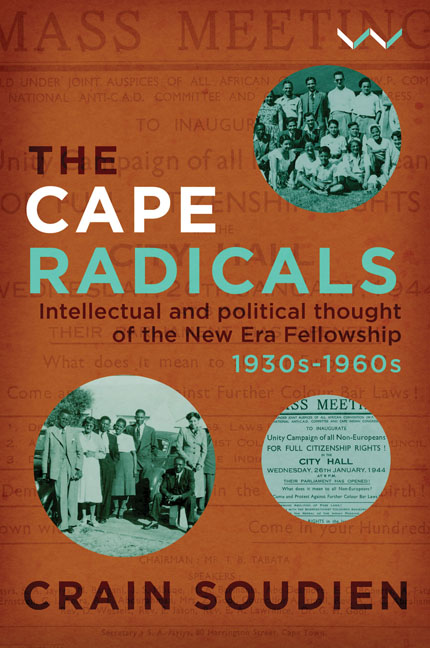Book contents
- Frontmatter
- Contents
- Acknowledgements
- Acronyms and Abbreviations
- Timeline
- Introduction
- 1 A Battle of Ideas
- 2 Planters of the Seed
- 3 ‘Anything under the Sun’: The Formation of the New Era Fellowship
- 4 ‘Honest, Sincere and Fearless’, 1937–1940
- 5 The Road to Emancipation, 1940–1953
- 6 A Cauldron of Conflict
- 7 Legacy
- Notes
- List of Illustrations
- Bibliography
- Index
2 - Planters of the Seed
Published online by Cambridge University Press: 29 October 2019
- Frontmatter
- Contents
- Acknowledgements
- Acronyms and Abbreviations
- Timeline
- Introduction
- 1 A Battle of Ideas
- 2 Planters of the Seed
- 3 ‘Anything under the Sun’: The Formation of the New Era Fellowship
- 4 ‘Honest, Sincere and Fearless’, 1937–1940
- 5 The Road to Emancipation, 1940–1953
- 6 A Cauldron of Conflict
- 7 Legacy
- Notes
- List of Illustrations
- Bibliography
- Index
Summary
In a review of the events of the political history of South Africa, essayist M M Herries, writing in the Educational Journal in 1961, commented that the 1930s was a ‘tumultuous’ period for South African politics. He reflected on the protests against the Hertzog Bills, the bills that had been designed to legislate against people who were classified as African and gave rise to the Natives Representative Council (NRC). ‘Like the pass campaigns,’ wrote Herries, ‘and multifarious ad hoc activities inspired for decades by certain political tendencies, they were – at the highest – fast-burning and quickly burnt-out fires.’ Much more significant, ‘was the formation in 1937 of the New Era Fellowship, [which] initially started out as a sorting-house of ideas and later developed into a political force which played a major part in changing the whole basis and outlook of the liberatory movement’.
It is not possible to describe precisely how the New Era Fellowship (NEF) came into being because not only are its founding documents not available, there are also no records of its meetings or testimony of those present at its establishment. Traces of the beginnings of the organisation have been found, however, and these are helpful. A significant find was a copy of its revised (in 1939) constitution. From this it is clear that the NEF was the product of an extraordinary conjuncture of forces, events and individuals. The forces were, on the one hand, the global schisms playing out in the community of communists, and particularly the fight between Stalinism and Trotskyism; on the other hand was the rising tide of struggles for independence around the world on the part of people who were not white: the Abyssinian repulsion of an invading Italian army, the Indian independence movement and China's civil war and the growth of its Communist Party.
In South Africa, the events were the immediate struggle around the accelerating colonial-racial project of stripping away the residual franchise rights of people classified as non-white, the majority of whom were people deemed to be coloured. The focus of the first of the Hertzog Bills was on ‘Africans’. This was followed by the attempts of the Hertzog-Smuts government to similarly disenfranchise people who were classified coloured.
- Type
- Chapter
- Information
- Cape RadicalsIntellectual and Political Thought of the New Era Fellowship, 1930s to 1960s, pp. 39 - 76Publisher: Wits University PressPrint publication year: 2019



